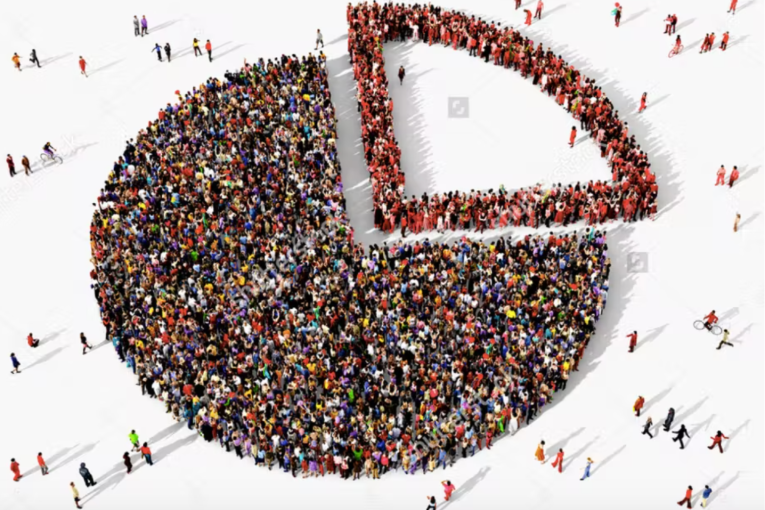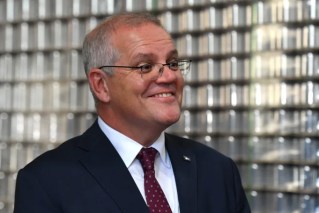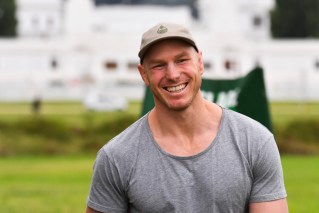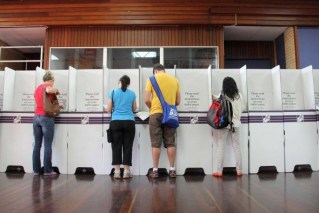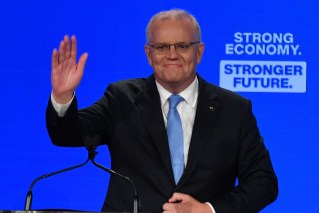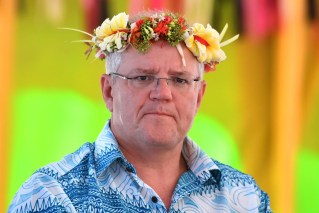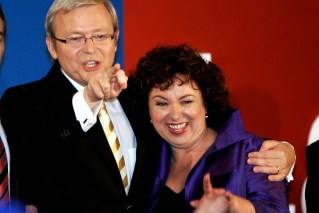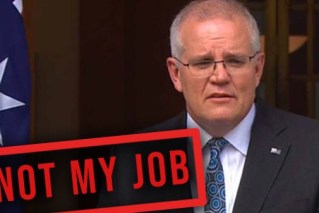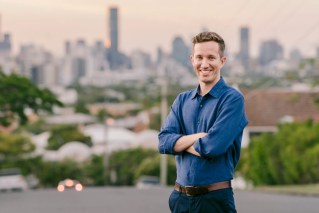National security was meant to be a trump card, but it’s turned Morrison into a joker
Scott Morrison wanted national security to be one of his three trump cards in this election. So far almost nothing has gone right for him in what is usually a given strength for the Coalition, says Dennis Atkins.

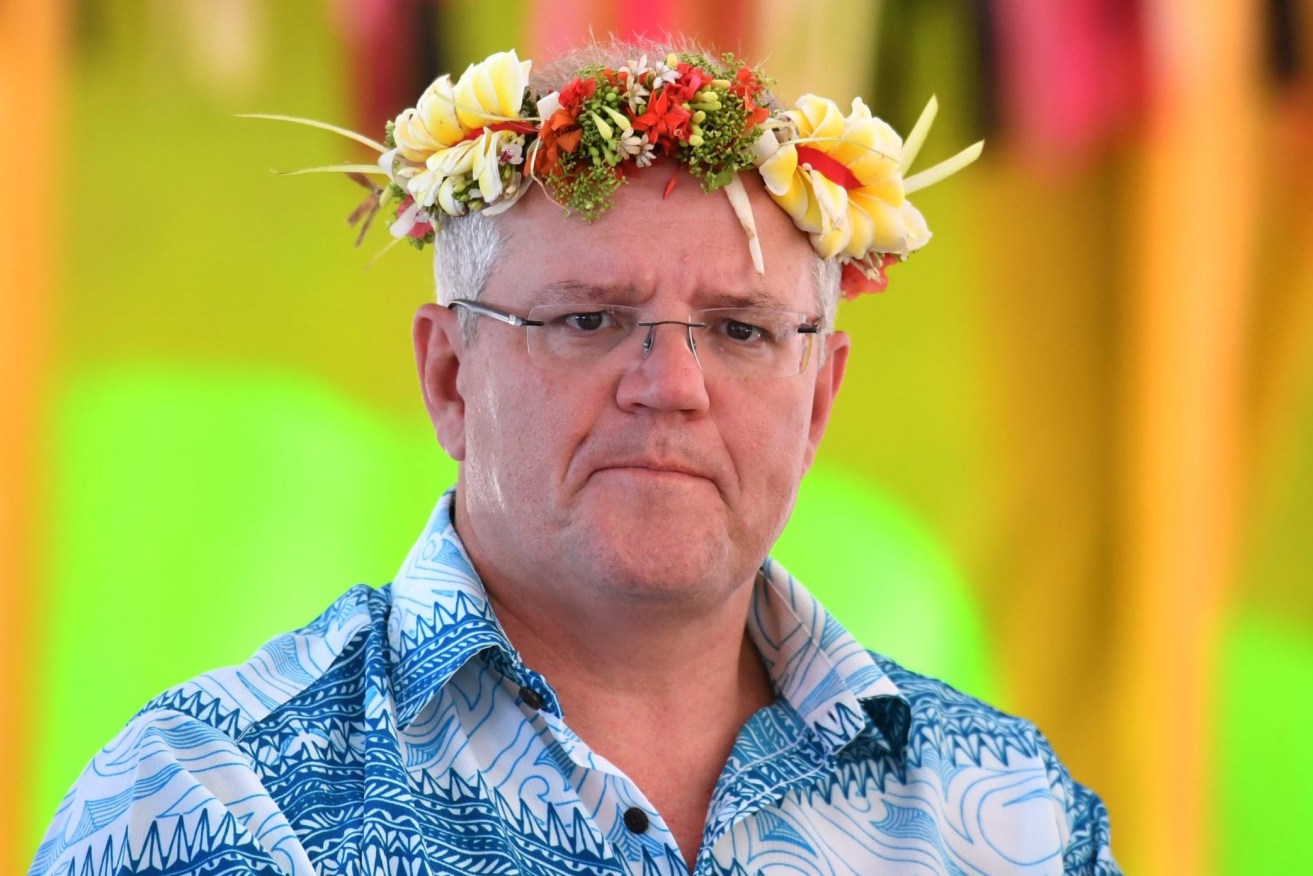
Prime Minister Scott Morrison arrives for the Pacific Islands Forum in Funafuti, Tuvalu, back in August, 2019. The government's handling of Pacific relationships has become a campaign burden. (AAP Image/Mick Tsikas)
A former Australian diplomat tried to burst the campaign bubble surrounding Scott Morrison on Thursday and, courtesy of some pushy-shovey minders, failed.
Trevor Sofield, who lives in northern Tasmania after a career in Foreign Affairs including half of the 1980s as our High Commissioner in the Solomon Islands, wanted to give Morrison some free advice on national security and diplomacy.
“We have lost the plot in the South Pacific,” Sofield told the media after those minders muscled him out of the way. “Given that I’ve got a degree of experience I think I know what I’m talking about.”
Sofield says the Liberals have “lost my vote” which might count for something because he lives in Bass, an ultra marginal seat the government really needs to retain. “Because of the way in which they have totally mishandled our national strategic interests, I’m no longer voting for the Liberal Party.”
Sofield put a face to a real policy and political failure that’s been exposed in this election campaign. Before calling the election early last month, Morrison worked overtime to construct a campaign based on three premises: Liberals are better economic managers and are essential to keep the purported post-pandemic gains intact, the strength and experience of Morrison himself contrasts against the claimed weakness of Anthony Albanese and, lastly, the superior national security credentials in the Coalition team.
Morrison and Defence Minister Peter Dutton monstered Albanese and his deputy Richard Marles in Parliament suggesting they were Manchurian candidates preferred by the Chinese Communist Party.
Like the well laid-plans of mice and men often going awry, as Scottish poet laureate Robbie Burns once said, these tactical schemes were already looking shaky before the election was called. A draft security pact between China and the Solomon Islands was leaked in March and confirmed just after Easter.
Labor, frustrated at being a punching bag on security issues, went on the attack, saying this was the greatest security failure in the region since the Second World War.
Despite some rhetorical push and shove from Morrison and Dutton the issue has been at best neutralised for Labor and at worst become a negative for the Coalition.
One of the mysteries inside this genuine failure is why the Morrison Government has been so inattentive.
Dr Lachlan Strahan, the government’s top diplomat for the islands (sitting just 1700 kms to the north east of Queensland), had been off the scene since September last year after becoming laid up with a back injury suffered during a trip back to Canberra. He only returned in late February just weeks after the first leak of the China security pact.
The government then sent a very junior minister Zed Seselja – who deals with the Pacific – to talk with the government in Honiara after the China deal was signed, sealed and delivered.
The US has been scrambling to re-establish relations with the Solomons as China has been racing to bring more and more island states under its thrall. Washington closed its embassy in Honiara in 2013 under Barack Obama – making a mockery of his boast to be the first Pacific president – and has been trying to put the pieces back together since Joe Biden took office 16 months ago.
After the details of the China security pact became public Washington sent its top regional expert, Kurt Campbell (the architect of the Pacific pivot under Obama and the go-to China guy in the White House), to Honiara by way of Port Moresby.
A careful reading of the statement issued by the White House shows Campbell found something of a mess in the Solomons. As well as saying the US would reopen its embassy in Honiara, the state department said a naval hospital ship would be dispatched to deal with a clear and present Covid crisis.
Just one in five people in the Solomons are vaccinated against the virus and the US is acting to get on top of what is evolving into a public health crisis. Australia has been trying to help with vaccinations – as has happened in other Pacific states – but there is local resistance to immunisation.
Elsewhere in the Pacific, Fiji mainly, Australia has been very successful in getting unused AstraZeneca vaccines into the community and used. But in some places, most significantly in PNG, this hasn’t happened because of local fear of vaccines.
Large amounts of unused AstraZeneca vaccine – left on the shelves in Australia because of short-sighted fear whipped up by Queensland’s former chief health officer Jeannette Young – have been thrown out in PNG because of suspicion about vaccination, often fed by misinformation on social media.
Australia has a naval landing helicopter dock ship used for hospital and rescue purposes – it was commissioned by the Rudd Government – but it’s out of service after it broke down during a mercy dash to Tonga following a tsunami in January.
All this shows how Australia has dropped the ball on the Pacific – a phrase used in focus groups and conversations on the street.
The level of anxiety this is causing Morrison and his government is apparent looking at the shield being used to protect the Coalition from criticism.
Morrison says he can’t say why his foreign minister Marise Payne didn’t fly to Honiara (she finally met her Solomons counterpart in Brisbane last weekend) or why he hasn’t picked up the phone to talk with the island state’s prime minister Manasseh Sogavare (they last spoke late in 2021) because of advice from Australia’s security chiefs.
It’s a handy catch-all to say it’s secret squirrel stuff. However, the failure to anticipate what China is up to with the Solomons – something obvious for years and made more critical because of the increasing number of Pacific states dropping support for Taiwan and moving allegiance to Beijing.
More recently China has rolled out more than $220 million in aid to Pacific states, targeting Vanuatu, Kiribati, the Solomons, Fiji and PNG. Washington has been so concerned that the US Secretary of State Anthony Blinkin visited Vanuatu in February in a bid to talk the local government back from what the Biden administration thinks is a push by China to have a full blown military base just two hours from Cairns.
By any measure, Morrison has failed in the Pacific and the next government has its work cut out to swing the sphere of influence away from China and back to the West. Meanwhile, the Coalition has ceded what should be a strength to Labor in a tight political contest.
This week Morrison couldn’t escape the failure on Solomon Islands policy and that “dropping the ball” will be on the big screen in the last week of the election campaign when Chinese Foreign Minister Wang Yi is reportedly planning a special visit to Honiara to sign the China-Solomons security deal.
As with so much that’s happened in this election, people are wondering how Morrison has managed to turn what should have been a royal flush into a potentially losing hand. The national security card is looking more like a joker.
